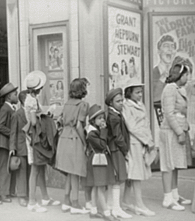
"Children in front of moving picture theater, Easter Sunday matinee, Black Belt, Chicago, Illinois" (Detail)
Credit and Original Image
Search this site:
Campus Resources
Black Film Course Offerings 2004-05
21000. (Re)Defining African American Cinema (=ENGL 27901, AFAM 21400, COVA 27901):
What is "African American Cinema"? Must a film be produced by African Americans, feature a Black cast, or address a Black audience in order to be classified as an "African American film"? Is there a discernible Black film aesthetic? Can a Black film be produced within the Hollywood studio system? How important are these distinctions? This course examines a wide variety of films ("race movies" of the early 20th century; fiction films; documentaries; animation; films made for television and the Internet) to explore how notions of African American authorship, content and reception have been defined and redefined in relation to dominant and independent media histories and institutions. J. Stewart. Autumn 2004.
34201. Cinema in Africa (=CMST 24201, ENGL 28600/48601):
This course examines cinema in Africa as well as films produced in Africa. It places cinema in Sub-Saharan Africa in its social, cultural, and aesthetic contexts ranging from neocolonial to postcolonial, Western to Southern Africa, documentary to fiction, art cinema to TV. We will begin with La Noire de... (1966), ground-breaking film by the "father" of African cinema, Ousmane Sembene, contrasted with a South African film, The Magic Garden (1960) that more closely resembles African American musical film, and anti-colonial and anti-apartheid films from Lionel Rogosin's Come Back Africa (1959) to Sarah Maldoror's Sambizanga, Ousmane Sembene's Camp de Thiaroye (1984), and Jean Marie Teno's Afrique, Je te Plumerai (1995). The rest of the course will examine cinematic representations of tensions between urban and rural, traditional and modern life, and the different implications of these tensions for men and women, Western and Southern Africa, in fiction, documentary and ethnographic film. L. Kruger. Spring 2005.